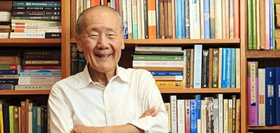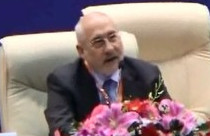Recent popularity of ‘family of origin’concept helps us grow
Author : LI YU and QI WEI Source : Chinese Social Sciences Today 2019-05-20

China’s latest popular drama, All is Well, has sparked huge debates on controversial social issues, as many believe the soap opera captures modern people’s pains, including those derived from original families. Photo: Mtime
China’s latest mega-hit drama, All is Well, has made the term “family of origin” a buzzword on the internet. Family of origin is an important concept in marriage and family therapy, which refers to the family or parents an individual was either raised by or born into. Some people use it to complain that “parents are a curse,” that the family of origin has ruined their chances of becoming a better version of themselves, and that all the negativity in their life is a result of their parents’ self-righteous parenting styles. A person and their family of origin are by all means inextricably tangled, and the effects of one’s family of origin can last a lifetime. Therefore, it is important to delve into the issue to figure out how it works and, more importantly, ways to help people move beyond any pain that has been caused by their family of origin.
Parenting styles
The family of origin theory points out how parenting shapes children’s core beliefs about themselves, the world and their relationship with others, which in turn affects social psychology in adulthood, namely emotion management, interpersonal communication, self-cognition and social adaptation. Failure to read facial cues, difficulties in communication with parents, a constant sense of inferiority, and a tendency to swallow insult and humiliation silently are often considered to be results of parenting style.
The effects caused by one’s family of origin are not based simply on a family member’s existence or a single event. In practice, these effects develop from trauma caused by parents’ long-term behavior, such as to affect one’s social competence. For example, some parents’ long-term verbal abuse takes a toll on children’s cognition and gives them a feeling of extreme insecurity. This kind of long-term behavior pattern falls under the purview of parenting style, so we argue that parenting style is the core cause of the family of origin effect.
All parents have their own approach to child rearing, which mainly concerns two dimensions: emotional involvement and discipline. The former refers to whether parents meet children’s needs, give children attention, respond emotionally to them, and show positive and affirmative attitudes in interaction with them. Discipline, on the other hand, is more purpose-oriented, which refers to whether parents set high standards for their children or whether they strictly regulate their children or indulge them.
Today, psychologists identify four major parenting styles: authoritarian, authoritative, permissive and uninvolved parenting. This is based on the research of developmental psychologist Diana Baumrind during the 1960s.
The authoritarian parenting style is characterized by a very high level of control with little communication and warmth. Authoritative parents have high expectations of children, but unlike the authoritarian style, they provide a great deal of support and guidance for their children. Permissive parents let their children do whatever they please with little guidance. Uninvolved parenting is characterized by both low expectations and low responsiveness. In some cases, these parents are simply unconcerned with their kids, yet still provide for their most basic needs. In extreme cases, these parents may be outright neglectful, ignoring even the simplest needs that their children may have.
Each of these parenting styles is marked by distinctive patterns of behavior and communication. These parenting styles can play an important role in early childhood development and development in later childhood, adolescence and even into adulthood. During later development is primarily when the family of origin effect kicks in.
The authoritative parenting style is typically identified as the best approach to parenting. Kids who grow up with authoritative parents tend to be more self-regulated and independent as they grow older. Authoritative parents tend to raise happier and more successful children.
In contrast, the authoritarian parenting style is often associated with lower self-esteem and a lack of self-control in children. The permissive parenting style tends to result in children who lack motivation, struggle with authority and report feeling less happy than their peers.
In reality, most families might not always fit perfectly into one style. Sometimes one can be more authoritative, but in other situations one might be more permissive or authoritarian. In the process, negative effects tend to be offset and leave no permanent traumatic mark on children’s lives.
However, it should be noted that a small proportion of children who grow up in extreme families are at risk of psychological trauma. For example, parents’ complete neglect and abuse of their children in their childhood will seriously damage that individual’s social and psychological competence and even cause the individual to suffer from mental illness. Therefore, it is urgent for society to pay attention to children from extreme families of origin, provide them with timely psychological relief and treatment, and prevent them from hurting themselves or others.
Cultural and social factors
Whether positive or negative, the family of origin effect does not happen in isolation or by accident. Rather, parenting style, whether emotionally involved or disciplinary, is not entirely determined by the parents’ intention, but the result of cultural and social structural influence.
In terms of emotional involvement, medieval Europeans believed and interpreted the doctrine of original sin as such that children were born sinful and therefore unworthy of their parents’ love. China has also had a similar view that “loving mothers often raise failing children.” In today’s world, we advocate the concept of unconditional love. In particular, in the one-child culture, there are often six adults spoiling one child.
From the perspective of evolutionary psychology, all individuals have offspring for the purpose of survival and reproduction. Turbulent or poor families tend to adopt the strategy of having more children, allocating limited resources to the children who are more likely to survive, be healthier and have more promising prospects, thus unconsciously forming a phenomenon of inequity within the family. In such families, the number of children dilutes parents’ emotional involvement, which can be very scarce, especially for the unfavored children. For more stable and affluent families, parents tend to give their children more resources, love and encouragement. Therefore, the way and degree of parents’ emotional involvement is not completely under their control, but also largely shaped by the cultural and social environment.
As for methods of discipline, sociologists have found that parents of different social classes vary not only in terms of their attitude toward education, their ability to provide academic guidance, and their handling of the relationship between home and school, but also in terms of cultural logic.
For example, for middle class families, parents often pay more attention to the cultivation of their children’s creativity, curiosity, autonomy and self-control, and they discipline their children in the way of encouragement and appreciation, democratic consultation and reasonable persuasion. For parents of lower social status, they tend to emphasize obedience to authority and praise personal qualities such as obedience, discipline, honesty and tidiness, and at the same time they treat their children through way of command, punishment and rejection.
Growing out of it
The focus on the family of origin has drawn much social attention to the psychological state of children and helped prevent the new generation of parents from adopting extreme parenting styles. However, it is not advisable to overgeneralize and exaggerate the role of the family of origin.
In fact, the family of origin is not a decisive factor for most of a person’s development. When children go to school, teachers become second parents. In adolescence, the peer effect becomes more prominent, which might offset much bad influence from the family of origin. In adulthood, a relationship with a partner may be similar to the family of origin relationship, and the couple is more likely to form a new intimate relationship. One can have a second chance at love.
Man is not a passive receiver of circumstances, but an active creator of fate. How to deal with the family of origin depends more on oneself. The inspiration of psychotherapy is that treatment does not necessarily require external intervention, and that if the individual is aware of the trauma, the corresponding psychological problem can be self-healing. In some cases, it is not events that lead to adverse consequences, but individuals’ poor perception of events that lead to adverse consequences. If one can change a perspective, one might step out of the shadow of the family of origin.
Nevertheless, discussing the family of origin concept is meaningful because it reminds us we need to work to create a good family environment and makes us consider which parenting style is more desirable, so that we can take a more rational view of family life. While the influence of the family of origin should not be underestimated, it is by no means all negative.
The previous generation was in thrall to their time, so it is not fair and constructive to blame our parents for all our problems. Not to mention our merits are also a possible inheritance from our parents. In this light, we need to establish a healthy view of our families of origin, let ourselves grow up, and be the best parents for our children we can be. This is the only way to move on.
Li Yu is from the Department of Sociology at Fudan University; Qi Wei is from the Department of Psychology at Fudan University.
(Edited by YANG XUE)
Interview with Wang Gungwu on significance of studying overseas Chinese
Wang Gungwu is a distinguished Australian historian who studies overseas Chinese. He currently works at the Faculty o...
-
On the rat/mouse of the zodiac
2020-02-20
-
Regional development calls for Huaihe culture’s soft power
2020-01-10
-
Archaeological discoveries unveil Maritime Silk Road
2020-01-06
-
China’s industrial art printing
2019-12-10
-
Yue-Gan Ancient Road: A journey into Hakka history
2019-05-13
-
The Lantern Festival in Dream of the Red Chamber
2019-02-18














 2011-2013 by www.cssn.cn. All Rights Reserved
2011-2013 by www.cssn.cn. All Rights Reserved